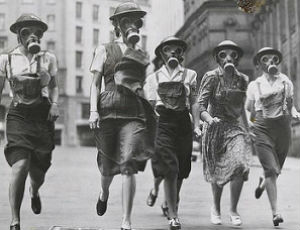Nothing in the 20th century seems to capture the imagination quite like the Second World War. Lots of books have been written by and about men, but there are also some very good books written by and featuring women. These are just a few of the most recent.
Martha Hall Kelly has never written a novel before, but this one's a winner: Lilac Girls follows three women through WWII and beyond. Caroline is a socialite and former Broadway star who volunteers at the French consulate. She falls in love with Paul, a married French actor, and their star-crossed romance continues throughout the book. Kasia is in love with Pietrick, and the Polish teenagers join the Resistance until Kasia is arrested along with her sister and mother and sent to Ravensbruck, a concentration camp for women. Kasia is experimented on and struggles to forgive those who wronged her. Kelly's real achievement is Herta, the German doctor who joins the staff at Ravensbruck out of misguided patriotism and her desire to practice medicine (not an easy thing to do as a woman in the Third Reich) and stays out of financial necessity and just plain evil. Kelly makes Herta human, with her own troubles (an abusive uncle, a dying parent, cutting), which is no mean feat. Meticulously researched, this book brings both real and imaginary people to life.
More great characters abound in The Nightingale, a war story about two very different sisters. Set in France before and during WWII, romantic Viann and rebellious Isabelle aid the Resistance in their own ways. Viann is forced to host a German officer while her husband is a prisoner of war, but she takes in her Jewish friend's baby and gets other Jewish children to safety in a convent. Isabelle guides shot-down airmen across the Pyrenees into neutral Spain and falls in love with a fellow partisan. Once again, there are great characterizations and moral dilemmas in this compelling, emotional novel.
The Race for Paris by Meg Waite Clayton is the Allied invasion as seen by female reporters. Once D-Day has proven to be a success, the question among the press is: who will be the first to report on the liberation of Paris? The military brass certainly doesn't want it to be a woman, women are to be kept far from the front lines. The American female press workers have other ideas, including scooping their male colleagues. So reporter Jane and photographer Liv enlist the help of male British press corps member Fletcher to get to the City of Light before anyone else. Emotions run high and there's a love triangle, but it never overwhelms the plot. Dramatic events and lush detail abound in this page-turner.
Josef and Lenka fall in love and marry in prewar Prague in Alison Richman's The Lost Wife. What should be a happy ending is only the start of tragedy and star-crossed love as the Nazis march into Czechoslovakia. Josef makes it to America and practices medicine. Lenka ends up in the Terezin ghetto and then Auschwitz. Eventually, they both marry other people, each believing the other dead for over 60 years. The themes of endurance and loss flow through this atmospheric and stylistically complex novel.
As you can see, not all women during WWII stayed at home, and those who did were anything but idle. Do you have more stories of women during the war? Let us know in the comments section.



Add a comment to: Love and War: Novels of World War II